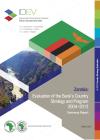
This report presents a summary of findings, conclusions and recommendations from an evaluation of the Bank's Country Strategies and Program in Zambia over the period 2002–2015. The evaluation was conducted to support the preparation of the Zambia Country Strategy 2016–2020 and contribute to IDEV's comprehensive evaluation of the Bank's development results (CEDR). The evaluation seeks to assess the relevance and performance of the Bank's strategic interventions in Zambia and identify findings, conclusions and recommendations to inform strategies and operations going forward.
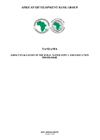
In 2006, the African Development Bank (AfDB) approved funding of USD 84m for Phase I of the Rural Water Supply and Sanitation Programme (RWSSP) in the United Republic of Tanzania. Phase II of AfDB funding, contributing USD 65m, ran from 2011 to 2015. The RWSSP is a contribution to Component 2 (Rural Water Supply and Sanitation) of the national Water Sector Development Programme (WSDP), 2006 –
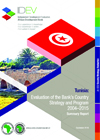
This evaluation examines the African Development Bank’s assistance to Tunisia over the 2004–2015 period as well as its contribution to the country’s development. It aims to draw lessons from past performance to improve the Bank’s future strategy and operations in Tunisia. Between 2004 and 2015, the Bank financed 58 projects in Tunisia worth over USD 3.4 billion.
This study aimed to (i) make an independent evaluation of the outcomes of the Bank’s development assistance in Morocco over the period 2004–2014; (ii) examine the causes and factors of success and failure; and (iii) make recommendations for potential improvements. The evaluation was based on the criteria of relevance, effectiveness, efficiency, impact and sustainability, and spanned slightly over two successive CSPs.
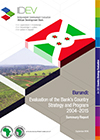
This document is a summary of the main findings of the evaluation of the African Development Bank’s strategy in Burundi during the 2004–2015 period. The evaluation was initiated and carried out by the Bank’s Independent Development Evaluation (IDEV) Department.
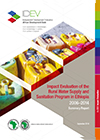
The main objective of this evaluation study is to provide credible estimates of the impacts of the RWSSP on participating communities and households, especially in terms of (i) access to and use of safe water, (ii) the incidence of diarrhea in children under five years of age, (iii) children’s school attendance, and (v) women’s participation in self-employment, and on the sustainability of the results.